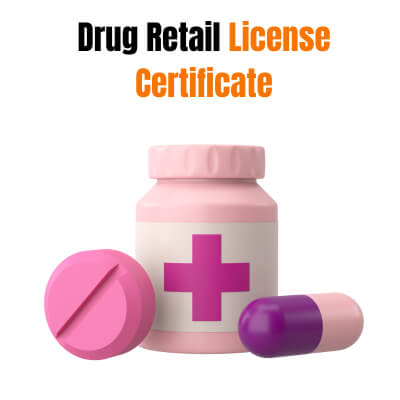
To run a pharmacy or other retail establishment that offers pharmaceutical products, one must obtain a drug retail license. Knowing what paperwork you need to get a medication retail license is crucial, whether you're an entrepreneur entering the healthcare industry or a pharmacist launching your own company. This blog post tries to streamline the procedure by providing a step-by-step list of the essential documents needed.
The process of obtaining a retail drug license commences with completing an application. The first point of contact with the regulatory bodies in charge of granting licenses is through this form. Usually, it needs basic applicant information as well as specifics about the location of the drugstore. Please ensure that you fill out this form completely and precisely, as any errors could cause the approval process to be delayed.
Providing identification proof is one of the basic criteria. This guarantees that the applicant is a bona fide company that is authorized to run a pharmacy. Government-issued IDs, such as passports, driver's licenses, or national identity cards, are frequently accepted forms of identification. To prevent problems during the verification procedure, make sure the identity documents are legitimate and up-to-date.
It is required for applicants for drug retail licenses to provide documentation of their academic background in pharmacy or a similar discipline. This demonstrates that the applicant possesses the skills and knowledge required to manage medications and give clients the right medical advice. To validate educational qualifications, copies of academic certificates or degrees are usually needed.
Applicants need to be registered with the Pharmacy Council or a similar regulating organization in several areas. This registration guarantees that pharmacists follow ethical procedures in their line of work and proves compliance with professional norms. The licensing application must be filed with a copy of the most recent Pharmacy Council license or registration certificate.
In order to assess if the suggested location is suitable for a pharmacy, a thorough site plan and layout of the premises are essential. The dimensions of the building, the pharmacy area's layout, the pharmaceutical storage facilities, and any other pertinent information should all be clearly shown on the site plan. This aids in the regulatory bodies' evaluation of whether the location satisfies the infrastructural needs for the safe storage and distribution of pharmaceuticals.
Candidates must show that they are the legal proprietors of the space where the pharmacy will be located or that they have a signed lease. This guarantees that the applicant is permitted by law to utilize the property for business. The terms and conditions under which the premises are rented, including the length of the lease and any clauses pertaining to renewal or termination, should be clearly stated in the lease agreement.
Applicants might have to get a No Objection Certificate (NOC) from the appropriate authorities, according to local laws. This certificate attests to the fact that opening a pharmacy at the suggested site is free from objections or legal restrictions. Depending on the jurisdiction, it can be needed from local health agencies, municipal authorities, or other regulatory entities.
A sworn declaration signed by a registered pharmacist who will be in charge of monitoring pharmaceutical operations at the retail location is called a pharmacist's affidavit. The pharmacist's registration number, contact details, and an affirmation of their commitment to upholding all legal and ethical requirements pertaining to the pharmacy profession are usually included in the affidavit. This paper assists in ensuring that pharmaceutical activities are managed by qualified personnel.
Regulatory bodies frequently need comprehensive details regarding the facilities used for handling and storing pharmaceuticals. This covers guidelines for maintaining proper temperature and humidity levels during storage, how shelves should be arranged, security precautions against theft and illegal access, and procedures for handling damaged or expired prescriptions. Giving thorough information about these facilities shows that the applicant is dedicated to upholding safety and quality standards.
It is crucial to guarantee the security of both clients and pharmaceutical products. As a result, applicants might need to get a fire safety certificate from the relevant authorities or the local fire department. This certificate attests to the property's adherence to fire safety laws and the presence of sufficient fire safety precautions. It might entail testing emergency evacuation protocols, firefighting apparatus, and fire exits.
For Online Registration Visit: Drugs License Application Registration and Certificate
To apply online for the drugs license, click HERE
Obtaining a drug retail license requires overcoming a number of legal criteria and providing the necessary documentation to prove adherence to professional and legal standards. Applicants can guarantee that their pharmacy operations meet the requirements for approval and expedite the licensing process by being aware of and prepared for these documents ahead of time. Every document is essential to proving the reliability, security, and caliber of pharmaceutical services provided to the public. Recall that getting a pharmacy retail license and starting a fulfilling career in the healthcare industry require careful planning and attention to detail.





We are the pioneers in offering environmental consulting services to our patrons, giving us the first mover advantage & keeping us ahead of our competitors.
Very experienced in filing, monitoring & issuance of CDSCO Certificates, Drugs Licensing, Environmental Impact Assessment, AERB certificates, Pollution Control Board CTE & CTO, Waste Management Authorization from State Pollution Control Boards, Fertilizers & Insecticides Licensing
